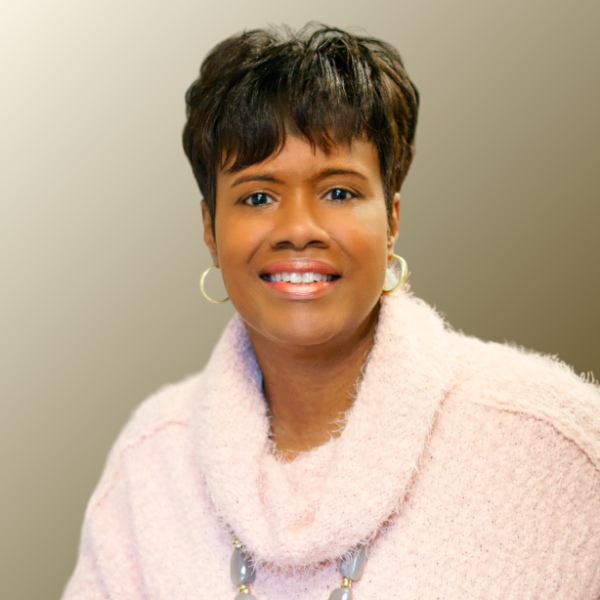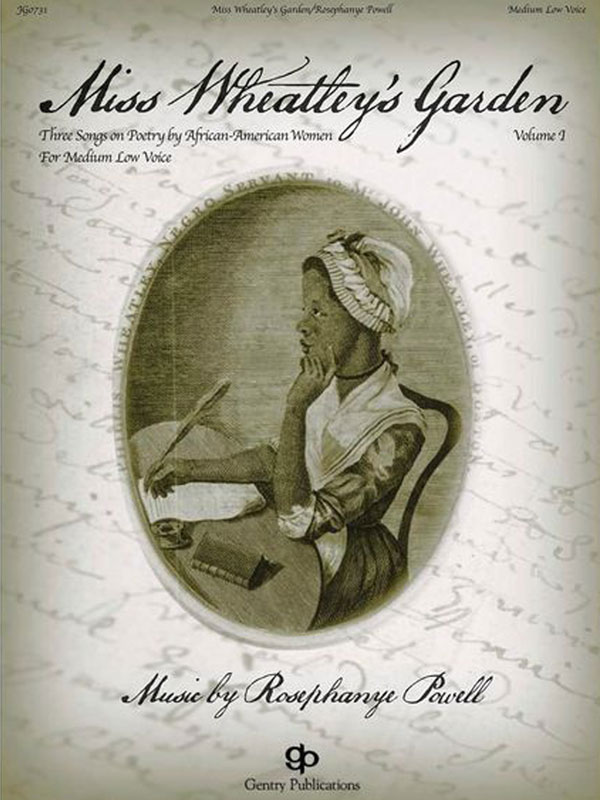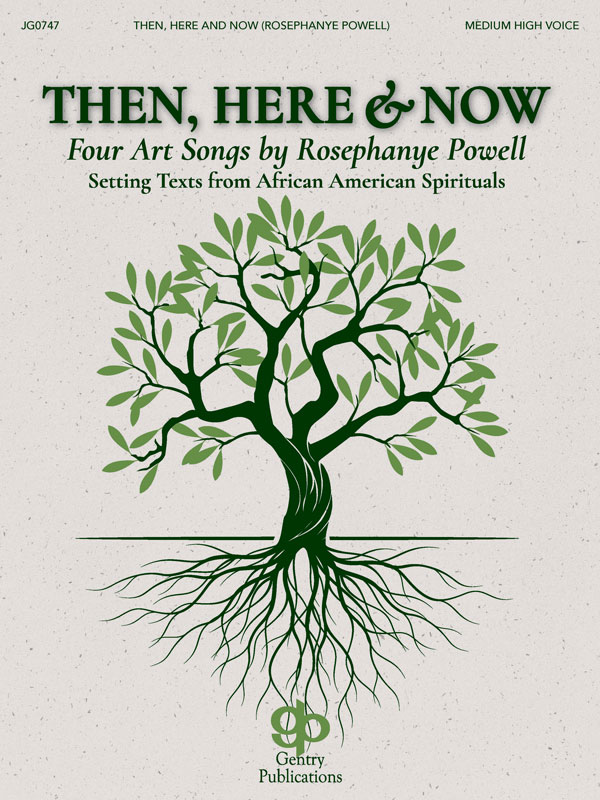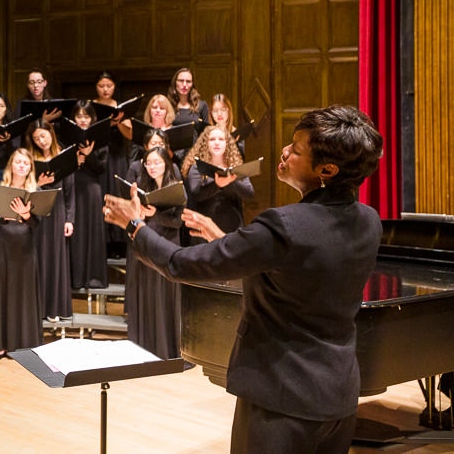
Q+A
Frequently Asked Questions and Answers About Acclaimed Composer, Conductor and Educator Rosephayne Powell.
How do you pronounce your name?
My name is pronounced “ro-SEH-fuh-nee”. If one thinks of the name “Stephanie”, adds “ro” and removes the t, one should pronounce Rosephanye correctly.
What is the origin of your name?
There are two stories. The first has it that my mother was encouraged, by her mother, to name me after my great grandmother whose name was “Josephine.” My mother, a school teacher, was not pleased at all with that idea. So she considered combining her name, “Rosa,” with “Josephine” to name me “Rosephine.” I am grateful that she did not like the sound of that name either. The name “Stephanie” was popular at the time. So, my mother combined “Rosa” with “Stephanie,” removed the [t] and changed the to [y] (because she thought it complimented the look of the name while functioning like to make the [e] vowel long rather than short). Everyone was happy… including me!
What was your first published composition?
My first compositions were published at the same time: The Word Was God, an original sacred motet, and I Wanna Be Ready, an accompanied spiritual arrangement (both SATB). While a doctoral student at Florida State University, I arranged the spiritual “I Wanna Be Ready” for the FSU Gospel Choir. At the concert performance Professor Rodney Eichenberger expressed interest in having the song published. He was kind enough to submit it to a publisher with whom he was associated. Unfortunately, it sat in that publisher’s files for a couple of years. When I began teaching at Philander Smith College, I composed “The Word Was God” for the school’s concert choir and was encouraged by several choral directors to submit it to a publisher. This time, I submitted both works to not one, but ten publishers—all accepted both works for publication. Needless to say, I learned from that experience that it is not a good idea to submit a song to more than one publisher at a time.

Miss Wheatley's Garden (2015)
A powerful vocal collection inspired by Phillis Wheatley, America’s first black poet. It features poems from Frances Ellen Watkins Harper (1825-1911), Angelina Weld Grimké (1880-1958) and Georgia Douglas Johnson (1877-1966). Rosephanye Powell set their literature to music, bringing light to and emphasizing their inspiring messages.
What is your goal as a composer/arranger?
My goal as a composer is to compose or arrange music that touches the heart and souls of the listeners and singers.
Why did you decide to become a music educator?
I became a music educator because I feel that I was created for such a purpose. Both my parents were educators so I got it naturally. Finally, I find meaning impacting the lives of others for good.
What are your first memories of singing?
I found my love for singing in high school when I started singing with three of my girlfriends. We annoyed many of the other kids in school because we sang in the school choir, restroom, gym, cafeteria and anywhere we found ourselves together. After a while, we formed a female gospel quartet.

Then, Here & Now
A cycle of four art songs based on African American spirituals. “Then, Here and Now” refers to spirituals’ enduring messages of hope, strength, healing, freedom, and justice. Because of their universal messages, it is Rosephanye’s intention for “Then, Here and Now” to be performed and embraced by people of all races, cultures, nationalities, and backgrounds.
Who and what are your biggest influences as a composer?
My first major influences were gospel, jazz, and R&B, since these are the styles of music that I listened to most as a kid. Next would be classical music, especially the music of Handel, Bach (counterpoint), Verdi and Puccini (romanticism and lyricism). William Grant Still, the dean of African-American composers, has influenced my style of composition. Most of the pioneers of classical spiritual arrangements have influenced me, including Undine Smith Moore, Hall Johnson, J. Rosamond Johnson, and others.
Which are your most popular works?
Since its release, The Word Was God has been my most popular. Others include I Dream A World (SATB), Non Nobis, Domine, (SATB), SORIDA (SATB), Sicut Cervus (SSAA), Still I Rise (SSAA), Ascribe to the Lord (SATB), Pete, Pete (children’s voices), E Oru O (SATB), I Wanna Be Ready (SATB), Sometimes I Feel Like A Motherless Child (SATB).
Can you name a special moment when your compositions have been performed?
Yes. And they are too numerous. But one that comes to mind is “Sing for the Cure”. I was asked to write one of the movements for this multimovement work that celebrates and honors the journeys of those who lost their battle with cancer, fought the battle and were victorious, as well as those loved ones who have traveled the journey with them. To be a part of the evening of the performance with poet-laureate Dr. Maya Angelou as narrator, the Turtle Creek Choral, The Women’s Chorus of Dallas, and the Metropolitan Symphony Orchestra was nothing short of exhilarating. But to hear from Tim (Dr. Timothy Seelig, director of the TCC) that at the rehearsal, Dr. Angelou, after hearing my song “The Promise Lives On” (lyrics by wonderful lyricist, Pamela Martin) performed by the chorus and orchestra, was so overcome with emotion and tears, had to gather herself before continuing on. As one of my favorite contemporary poets, it was most gratifying and humbling. “Sing for the Cure” has allowed me to play a small part in telling the life stories of so many cancer survivors and fighters. I am so grateful to have had such an opportunity.
There are so many more special moments, most of which are about the singers who sing my music. They bring it to life and make moments special even when the performances are not the strongest.
What contributed to you being a successful composer?
That is difficult to answer. I think that the singers and music directors could answer it more effectively. But, as a singer, my main endeavor is to write music that touches the heart and sings well in the voices. I believe that God has given me a talent for writing music (especially since I was not a strong student in music theory and don’t always think theoretically when composing). Compositionally, I flow from a lyrical vocal line, rhythmic energy and colorful harmonies that support and paint the lyrics. For me, everything flows from a desire to express the meaning of a text.

Composer, Conductor and Educator
Celebrated as one of America’s foremost women composers of choral music